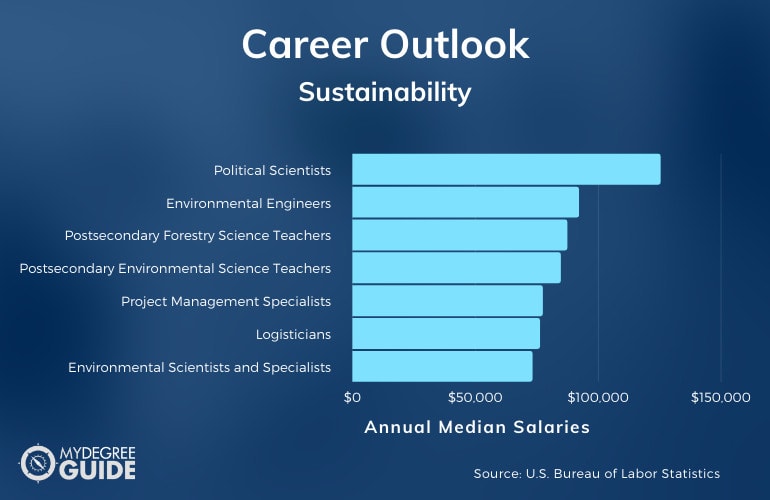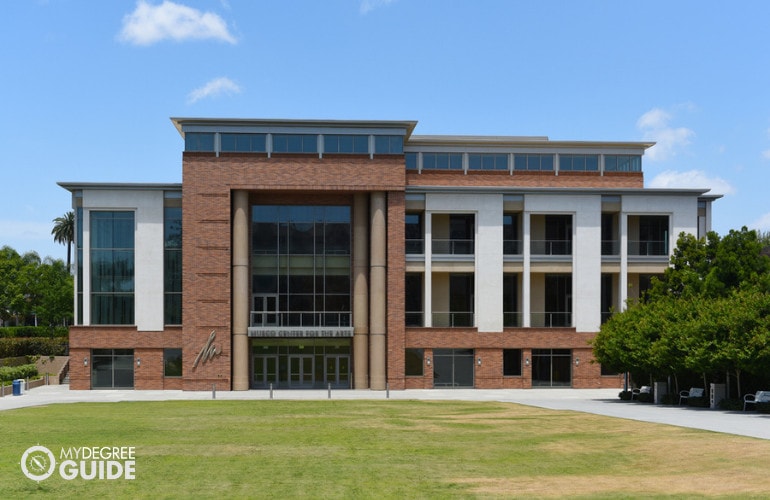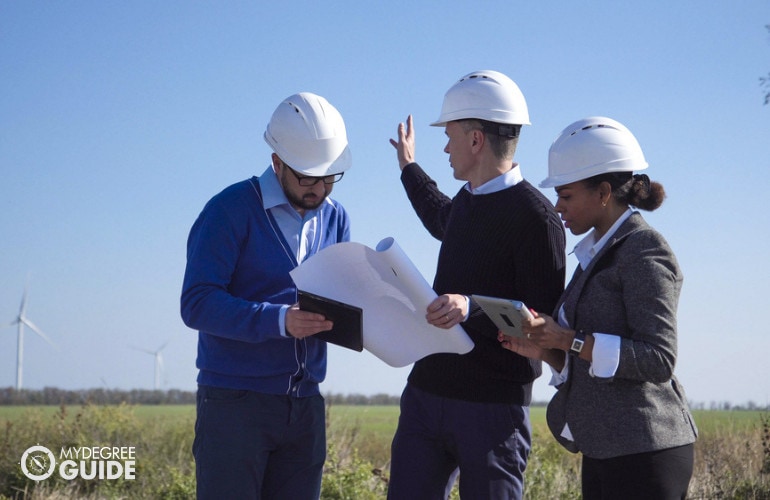Many colleges now offer an online masters in sustainability so students can receive a graduate education related to conservation, green practices, and the environment.

The lessons taught in this degree program can play a pivotal role in advancing scientific research and moving organizations toward more environmentally friendly choices. As a sustainability graduate student, you can expand your knowledge of ecosystems, human behavior, public policy, and business leadership.
Editorial Listing ShortCode:
Along the way, you may position yourself as a leader who’s prepared to tackle 21st-century problems and develop sustainable solutions.
Universities Offering Online Masters in Sustainability Degree Programs
Methodology: The following school list is in alphabetical order. To be included, a college or university must be regionally accredited and offer degree programs online or in a hybrid format.
Antioch University
Antioch University offers an MBA in Sustainability. The program is designed to teach students how to sustain the triple bottom line: people, planet, and profit. Coursework includes both practical and academic experiences. With rigorous study, this degree can potentially be completed online in just 18 months. Antioch is accredited by the Higher Learning Commission.
Antioch University is accredited by the Higher Learning Commission.
Black Hills State University
Black Hills State University offers a Master of Science in Sustainability. Courses include Fundamentals of Sustainability, Science for Sustainability, Environmental Economics, Human Dimensions in Sustainability, and Environmental Law and Policy. Applicants can apply without GRE scores as long as their GPA is above 2.75.
Black Hills State University is accredited by the Higher Learning Commission.
Concordia University – Wisconsin
Concordia University—Wisconsin offers an MBA in Sustainability Management and Analytics. It requires the completion of 36 credits to graduate.
It is designed to help students learn how to make positive social impacts in their organizations. The program covers topics such as macro and microeconomics, decision making, environmental chemistry and toxicology, statistical analysis, and industrial ecology.
Concordia University – Wisconsin is accredited by the Higher Learning Commission.
Montclair State University
Montclair State University offers an online MS in Sustainability Science. It is designed to prepare students for leadership roles in government agencies, non-profit organizations, and private sector companies. It requires the completion of 32 credits to graduate and can typically be completed in 1 to 3 years. Applications are accepted on a rolling basis.
Montclair State University is accredited by the Middle States Commission on Higher Education.
Northeastern University
Northeastern University offers an online MBA program with a concentration in Sustainability. The curriculum features a blend of business and technology. Classes are limited to just twenty students. The program can potentially be completed in as little as two years. It also includes an optional campus residency where online classmates can meet.
Northeastern University is accredited by the New England Commission of Higher Education.
Southern New Hampshire University
Southern New Hampshire University offers an online MBA program with a concentration in Sustainability and Environmental Compliance. The program is accredited by ACBSP and can potentially be completed in just one year. Course options in the program include Energy and Society, Environment Compliance/Sustainability, and Environment Issues.
Southern New Hampshire University is accredited by the New England Commission of Higher Education.
University of Arizona
The University of Arizona offers an online Master of Engineering in Innovation, Sustainability, and Entrepreneurship. This program requires the completion of 30 credits. It includes courses on business and management, as well as advanced materials and cutting-edge developments in materials science and engineering.
The University of Arizona is accredited by the Higher Learning Commission.
University of Houston – Clear Lake
The University of Houston—Clear Lake offers an online MBA program with a concentration in Environmental Management. Students who choose this concentration take courses in Environmental Law and Environmental Risk Management. This program requires the completion of 36 credit hours. It features accelerated courses that are just 8 weeks long.
The University of Houston-Clear Lake is accredited by the Southern Association of Colleges and Schools Commission on Colleges.
University of Vermont
The University of Vermont offers a Master’s in Leadership for Sustainability. The program uses a cohort model and requires the completion of a capstone project. The workload and schedule are designed for working professionals. Courses emphasize relationships and include synchronous meetings. This is a low-residency program that includes week-long intensives.
The University of Vermont is accredited by the New England Commission of Higher Education.
Wilmington University
Wilmington University offers an MBA with a concentration in Sustainability. Classes start every 8 weeks, and the program is accredited by the International Accreditation Council for Business Education. The program can potentially be completed in just one year, either in-person or online. Courses include Organizational Behavior and Ethical Leadership, Managerial Decision-Making, and Survey of Data Analytics.
Wilmington University is accredited by the Middle States Commission on Higher Education.
Online Masters in Sustainability Programs

Environmental problems are pressing in on every side, but that doesn’t mean you have to give up and admit defeat. Rather, you can choose to address environmental issues head-on with education and a career in the conservation and sustainability field.
Earning a master’s degree in sustainability could provide the essential education needed for an advanced role in this area. In environmental sustainability graduate programs, you may study topics like:
- Change management
- Communication strategies
- Ecology
- Economics
- Energy use
- Geographic information systems
- Land use
- Law and public policy
- Research methods
- Statistics
Fieldwork is common in sustainability master’s degree programs. You may spend time working on location or gathering environmental samples. An internship can help you put classroom lessons into practice. There may be several lab courses, too.
Sustainability can involve science, engineering, research, education, business, logistics, and political science. The concentrations for a sustainability degree could include environmental leadership, informatics, public policy, ecological science, or environmental engineering.
Alternatively, some schools offer sustainability studies as a concentration within the Master of Business Administration (MBA) program. Other schools may offer this specialization within the Master of Public Policy (MPA) program.
Some master’s degree programs include a thesis component. A thesis is a major research paper designed to wrap up a year or more of studies. Other programs may involve a capstone project. Having a master’s degree in sustainability can lead to a wide variety of career opportunities.
Some professionals work as scientists or engineers, and others are business leaders or educators. Nonprofit work and public policy advocacy are other options for experts in sustainability. In general, no matter their professional titles, sustainability graduates strive to make the world a safer, healthier place for everyone.
Common Online Master’s in Sustainability Specializations

Sustainability studies are prized in a wide range of sectors these days. From nonprofit leadership to business innovation, there’s demand for sustainability know-how.
To prepare you for a particular application of your skills, you may want to choose a concentration for your degree program.
- Ecology. This concentration focuses on biology, ecosystems, land use, and climate change. Because of the emphasis on biology and other sciences, fieldwork and labs are common requirements for this concentration.
- Environmental Education. You can learn to communicate environmental information and help others modify their behavior. For licensed teachers, this concentration could enhance a K-12 teaching career, but it could also benefit those who work in outreach or higher education.
- Management and Leadership. If you have your sights set on heading up conservation organizations or leading project management teams, then this concentration could help you learn the necessary skills. The courses may cover topics like decision-making and communication.
- Public Policy Analysis. By studying government, economics, and public interest, you can prepare to influence environmental policies and advocate for change. Students in this track may plan to work for government agencies or NGOs.
- Geospatial Studies. This concentration emphasizes geographic information systems (GIS) and data analysis techniques for environmental research and strategizing. Technological tools play a key role in this discipline.
Some colleges allow students to select multiple concentrations for a truly customized approach to sustainability education.
Sustainability Careers & Salaries

People who earn a master’s degree in sustainability usually aim for careers that support the wellness of the planet and the plants, animals, and people who occupy it.
Some choose careers as conservation and environmental scientists. These professionals often work for federal agencies or state and local governments. Graduates with training in ecology or biology may become zoologists or wildlife biologists.
Environmental engineers work closely with environmental scientists. They use scientists’ data and research to develop plans for restoring habitats or protecting natural resources. Sustainability experts can also help businesses become more eco-friendly.
Some work as logisticians who decrease the environmental impact of transportation and supply chain activities. Others work as project managers or environmental specialists who put green initiatives into place.
According to the Bureau of Labor Statistics, jobs in the life, physical, and social sciences pay a median annual salary of $69,760.
| Careers | Annual Median Salaries |
| Political Scientists | $125,350 |
| Environmental Engineers | $92,120 |
| Postsecondary Forestry and Conservation Science Teachers | $87,400 |
| Postsecondary Environmental Science Teachers | $84,740 |
| Project Management Specialists and Business Operations Specialists | $77,420 |
| Logisticians | $76,270 |
| Environmental Scientists and Specialists | $73,230 |
| Zoologists and Wildlife Biologists | $66,350 |
| Conservation Scientists | $64,020 |
| Foresters | $63,980 |
The concentration area for your online masters degree in sustainability may influence which career tracks are right for you. Graduates, especially those with training in geographic information systems (GIS), may work as foresters. They can be involved with timber growth or harvesting.
Many graduates focus on caring for the planet through policies and laws. They may be policy analysts, whom the Bureau of Labor Statistics classifies as political scientists. They can also work for non-governmental organizations (NGOs), nonprofits, or lobbying groups.
Some professionals with a master’s in sustainability pursue academic careers. They may teach college classes on environmental or conservation science. A master’s degree is sufficient for teaching at some schools, especially community colleges, but getting a doctoral degree may lead to roles at larger universities.
Sustainability Master’s Curriculum & Courses

Program lengths vary, but many require between 30 and 42 credit hours. To earn the necessary credits, you may take courses like the ones listed below:
- Change Leadership: In this course, you’ll learn to help organizations make changes toward greener, more sustainable operations.
- Communications for Sustainability: You can learn to deliver compelling messages through oral, written, video, or digital formats that can persuade or inform others about environmental issues.
- Ecosystems: On land and in the water, every ecosystem undergoes processes related to chemistry, biology, and other scientific disciplines. This course can increase your understanding of those processes and the similarities and differences between ecosystems.
- GIS in Conservation Science: After learning the basics of geographic information systems (GIS), you can learn specific skills for putting these tools to use in your sustainability research and efforts.
- Public Policy for Environmental Issues: In this class, you’ll discuss the ways that policies are developed and implemented and the roles that both political entities and NGOs play.
- Research in Environmental Science: This course will cover research topics like experimental design and data analysis.
- Sustainable Cities: As you learn about sustainable practices for urban areas, you may read case studies or visit cities.
- Sustainability Leadership: You can develop your leadership skills and learn more about working as a leader who spearheads green initiatives within an organization.
- Sustainability Strategies: This may be an introductory course that lays the foundation for additional graduate-level studies in sustainability science.
- Transportation Issues: You may discuss vehicle pollution and sustainable approaches to transportation technology for both private drivers and commercial shipping services.
The concentration you choose for your degree program can have a good deal of influence over which courses you take. For example, an enterprise concentration will likely include more logistics training, while an ecology concentration could include more wildlife biology courses.
Sustainability Masters Program Admissions Requirements

A strong application packet may help you get into the masters in sustainable management program of your choice. Application requirements generally include:
- GRE scores (only required by some universities)
- Personal essay or academic purpose statement
- Resume, showing field experience
- Transcripts from a regionally accredited college
Admission requirements can vary from one school to the next, so it’s necessary to read all instructions carefully before gathering your materials. For instance, some programs may want your resume to show at least 3 years of work experience in the field.
Master of Sustainability Accreditation

The top schools to consider for your masters in sustainability online degree are ones that hold regional accreditation. Respectability and regional accreditation go hand in hand.
Often, financial aid can be used only at accredited schools. In order for your master’s degree to be viewed as a credible qualification, it typically needs to be accredited. If you decide to transfer schools partway through your studies, your new program may accept your previous accredited coursework. Also, earning an accredited degree can be a prerequisite for getting into a doctoral program.
For more information about approved regional accreditors and accredited schools in the US, you can visit the US Department of Education’s website.
Master Programs in Sustainability Financial Aid and Scholarships

Applying for financial aid opportunities may help make your graduate studies more affordable. If you qualify, both government and private assistance may be part of your financial aid package.
Graduate students are most likely to get low-interest loans from the government. In some cases, they may be eligible for grants as well. You may want to look into both state and federal programs. Applying for government aid begins with filling out the Free Application for Federal Student Aid (FAFSA). Scholarships are another key source of aid for many students. You may be offered scholarships directly from your school.
You can also apply for scholarships from outside organizations, such as community clubs or philanthropic groups. Environmental advocacy associations may offer scholarship programs for sustainability students as well. In addition, you can check with your employer about financial assistance options. Some companies have programs set up to help their employees pay for tuition.
Can I Get a Masters in Sustainability?

Yes, you can learn new skills and bolster your resume by earning a masters degree in sustainability. Some colleges even offer online programs for graduate studies in sustainability so that you can study this topic in a flexible format that suits your schedule.
You may be able to select a concentration for your sustainability degree as well. Concentration options can include environmental policy, conservation education, ecology science, or geographic information systems. Some schools offer a sustainability concentration within another program, such as the Master of Business Administration (MBA).
What Can You Do with a Masters in Sustainability?

Some students use their online sustainability masters degrees for scientific careers. They may work as environmental, conservation, or wildlife biology scientists.
Others pursue engineering careers. According to the Bureau of Labor Statistics, environmental engineers help develop plans for environmental restoration or increased sustainability. Professionals with master’s degrees can also help communities or companies increase their green practices. That could involve being an urban planner or a logistics director.
A master’s degree may also lead to teaching positions at some colleges. Teachers could be adjunct faculty members or community college professors in the conservation or environmental science departments.
Is Environmental and Sustainability Management a Good Career?

Yes, environmental and sustainability management is a good career for many professionals. Professionals who study this topic can have career options in a wide variety of industries, including research, logistics, regional development, education, and government.
Many jobs for sustainability experts can bring in dependable salaries. For example, the Bureau of Labor Statistics states that environmental engineers usually make between $55,450 and $144,670 annually. Environmental scientists and specialists may earn between $42,960 and $129,450 (Bureau of Labor Statistics). Working in this field can also provide the satisfaction that you’re doing something good for the Earth.
How Long Does It Take to Get a Masters in Sustainability Degree Online?
How long your program takes to complete may depend on your availability as well as the program requirements. It often takes about 1 year of full-time study, including summer courses, to complete a 36 hour master’s program that doesn’t include a thesis component.
Programs that require more credit hours, an internship, or a thesis often take longer to finish. Part-time enrollment can slow down your progress too. Depending on your circumstances, it may take up to 3 years to complete your online sustainability masters degree program.
What’s the Difference Between an MBA vs. MS in Sustainability?
While some schools offer a standalone degree in sustainability, others include sustainability as a concentration option for a Master of Business Administration. Here’s how an online MS in Sustainability compares to an online MBA in Sustainability.
| MS in Sustainability | MBA in Sustainability |
|
|
Some schools offer joint MS-MBA programs or MS in Sustainable Business degrees.
What’s the Difference Between a Master of Science vs. Master of Arts in Sustainability?
Either a Master of Arts or a Master of Science in Sustainability can contribute toward your career goals. Let’s take a look at how these two programs compare.
| MS in Sustainability | MA in Sustainability |
|
|
Overall, there can be a good deal of overlap between the two programs.
Is a Masters in Sustainability Worth It?

Yes, a masters in sustainability is worth it for many students. Through this degree program, you can gain employable skills that can help you care for the planet and improve people’s health and safety.
Increased employment opportunities are also predicted for some professionals in this field. According to the Bureau of Labor Statistics, jobs for environmental specialists and scientists are expected to grow at an 8% rate over the next ten years.
Positions for conservation scientists and foresters are growing at a 7% rate. Some sustainability experts may be well-suited for roles as logisticians, a position that is expected to experience 30% job growth over the next ten years (Bureau of Labor Statitics).
Getting Your Master’s Degree in Sustainability Online

Sustainability is a pressing issue in today’s world. Gaining a graduate education in this field can help prepare you for addressing modern sustainability needs.
As you study for a master’s degree, you can gain essential skills that are applicable in business, education, public policy, engineering, and scientific research. You can even earn a sustainability master’s degree online. Online sustainability degree programs can be accredited and respected, and going to school online is a convenient alternative to on-campus classes for many students.
If you’re interested in the flexibility of distance learning, you can start checking out accredited online masters programs in sustainability today.
